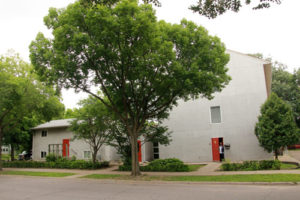01 Jun Ms. Bea’s House Offers the Next Step in Recovery

by Stephen Robinson, Housing Director
In conjunction with our Best Practices, Turning Point has established a continuum of services that addresses the after – treatment needs of our clients (African American men), particularly those with histories of drug and alcohol addiction and homelessness.
Ms. Bea’s House is the next step in the recovery process. It addresses the often asked questions “What now?” and “Where do I go from here?” As a 32 – bed, room and board facility, Ms. Bea’s has served over two – hundred and fifty homeless African American men from a cultural perspective since its opening in 2012.
The facility operates on a case management service model that focuses on addressing at least five of the contributing factors leading to addiction: stress, homelessness, unemploy – ment, education, and access, all of which have received individualized case man – agement service. Of the 250-plus residents, 193 (or 77%) have come straight from Turning Point’s treatment program. Another 41 have shared addiction – related issues that partly brought them to a state of homelessness and ultimately to Ms. Bea’s.
A bed and three meals a day provides some of the stress relief. Our case manage – ment in collaboration with the Goodwill Easter Seals Employment and Training staff has been able to support the efforts of 79% of the men coming through the program. Our combined efforts have enabled us to help them secure full or part – time employment, college or a career training program. The average length of stay is about eleven months, after which time approximately 58% have moved on to permanent housing either through Minnesota Housing Authority, Catholic Charities or other community connections.
As part of our continuum, Ms. Bea’s residents who have achieved their established personal goals become eligible to move on to our (GRH) Supportive Housing Program or Single Adult Housing Program apartments. By the time he has traveled through the continuum he is confident, clean, self – supporting and has community resource information. More often than not he has established a positive inner circle support system of friends, introduced some level of spirituality into his life and re – connected with his family.



